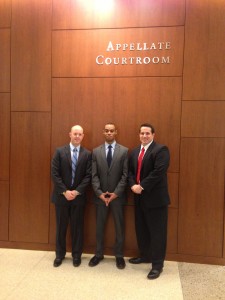Congratulations to the Marquette National Moot Court Team
 Please congratulate third-year law students Hans Lodge, Brendon Reyes, and Robert Steele for their recent participation in the final rounds of the National Moot Court Competition (NMCC) in New York. The team was coached by Attorneys Emily Lonergan and Jason Luczak. The NMCC is hosted by the New York City Bar Association and the American College of Trial Lawyers.
Please congratulate third-year law students Hans Lodge, Brendon Reyes, and Robert Steele for their recent participation in the final rounds of the National Moot Court Competition (NMCC) in New York. The team was coached by Attorneys Emily Lonergan and Jason Luczak. The NMCC is hosted by the New York City Bar Association and the American College of Trial Lawyers.
I am grateful to the team for their tremendous hard work in all stages of preparation including brief writing and oral argument practice. I could not be more proud of them. Their coaches also put in countless hours of practice time with the team. This team is special for many reasons, but among them are that Brendon Reyes is our current Moot Court Association Chief Justice, and Emily Lonergan was our Chief Justice in the 2010-11 year. What a talented and dedicated group of students and young lawyers I am privileged to work with.


